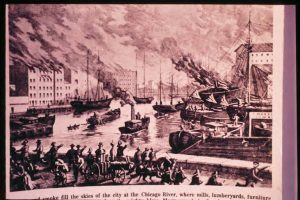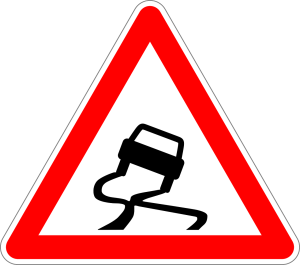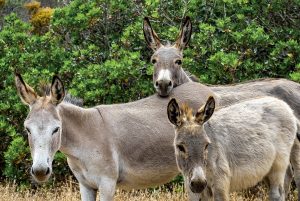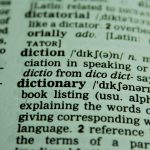Part Three Editing / Grammar Skills
Unit 12 Expressing Meaning in Past Tenses
Learning Objectives
- To understand the verb forms and meanings of three past tenses – simple past, past progressive, and past perfect– through multiple examples
- To practice using the appropriate past tenses in a variety of writing situations
I. Pretest

In the following account about the Great Fire of London in 1666, the verbs are bold-faced. If the bold-faced verbs are correct, choose “correct’. If not, choose one of the other two answers. You will get instant feedback on your choice. If you make mistakes, you can retry all the questions or see all the answers at the end of the pre-test.
Adapted from https://en.wikipedia.org/wiki/Great_Fire_of_London. Last accessed on September 21, 2021.
II. Expressing Meaning in Simple Past
For explanations and examples of “Be” verbs and “Do” verbs, open Unit 9 here.
Verb Forms in Simple Past
1. When “was” or “were” is the main verb, do not use a “do” verb. In the same way, when the main verb is a “do” verb, do not use “was” or “were”.
- The Great Fire of London was a serious disaster. It
wasoccurred in 1666.
2. Add an “ed” to the end of a regular “do” verb.
- It destroyed a big part of London
3. After “did” in a question and negative sentence, use the base form (without -ed) since you already have a helping verb “did”.
- How long did it last? It lasted almost five days.
- Did it kill many people? No, it did not kill too many people. According to some reports, it killed six people.
4. “Used to + base verb” is common for past regular activities.
- People in London used to talk about this fire in great terror[1].
For a list of verbs with irregular past tense and past participle spelling, please refer to Appendix D Irregular Verbs. Open Appendix D here.
Meaning, Common Expressions, and Examples in Simple Past
Meaning #1: activities or situations that started and completed at a specific time in the past
Common Time Words: yesterday, last night, two days ago, in 2000 …
Examples: about the Great Chicago Fire
-

Great Chicago Fire The Great Chicago Fire occurred on October 8th through October 10th in 1871.
- It killed approximately 300 people and destroyed about 3.3 square miles of the city.
- It damaged 17,500 buildings and left more than 100,000 residents homeless.
- The fire spread quickly because the firefighters received the wrong information and did not come to the right place to rescue[2].
- It was the biggest fire in the history of Chicago.
Adapted from https://en.wikipedia.org/wiki/Great_Chicago_Fire. Last accessed on June 1, 2021.
Meaning #2: past routines, past habits, past situations.
Common Time Words and Frequency Adverbs: always, constantly, frequently, usually, often, generally, sometimes, seldom, rarely, hardly ever, never, every day, each night, once a week, on Tuesdays …
Examples: about a family’s past fire prevention routines
- When I was a child, my family tried different ways to prevent house fires.
- My mother used to make sure that the stove was off before she went to bed every night.
- My father used to make sure that all the electronic wires were in good working order.
- Sometimes, we had to use candles.
- Why did we have to use candles? In those years, power outage[3] happened very often.
- My parents did not allow my younger sister to be near the flame, but they let me because I was old enough.
Exercise 1. An account of the Great Chicago Fire continues below. Fill in the blanks with the correct simple past verbs. The first one is an example. When you complete the entire exercise, you can click “Check” for feedback. You may retry or see all the answers.
III. Express Meaning in Past Progressive (No Non-Action Verbs)
Verb Forms in Past Progressive: was/were + verb-ing
Meaning, Common Expressions, and Examples in Past Progressive
Meaning #1: An action was in progress at a specific time in the past.
Common Time Expressions: at this time yesterday, at 9 am this morning, at 4 pm last Tuesday, at that moment, at that time …
Examples: about encountering[4] a car accident while driving
- At 9 am on a Monday last December, I was driving to college.
- My friend Angela was sitting in the passenger seat at that time.
- At the same time, we were listening to the news on the radio. We were not talking to each other.
- It was snowing at that moment.
Meaning #2: A long action was in progress when a short action happened.
Common Time Expressions: when, while (“when” with simple past for shorter action; “while”‘ with past progressive for longer action)
Examples: about encountering a car accident while driving

- I was driving to our college when we heard on the radio that there was an accident just ahead of us.
- When we heard the news, Angela was drinking her morning coffee in the car.
- While I was driving, we heard on the radio that there was an accident just ahead of us.
- We heard the news while Angela was drinking her morning coffee in the car.
Meaning #3: Two past actions were both in progress at the same time in the past.
Common Time Expressions: while
Examples: about encountering a car accident while driving
- I was driving while Angela was drinking coffee.
- While we were waiting in the car for the accident to be cleared, many other drivers were also waiting patiently in their cars.
- While Angela and I were chatting in the car, our classmates were getting ready for the morning class at college.
When you include “when” or “while” in your sentence, you are writing a complex sentence.
For detailed explanations and examples of complex sentences, open Unit 7 here.
Exercise 2. Below is a story about a man and his donkeys. Fill in the blanks with the correct simple past and past progressive verbs. The first one is an example. When you complete the entire exercise, you can click “Check” for feedback. You may retry or see all the answers.

IV. Expressing Meaning in Past Perfect
Good news – The past perfect tense is much easier than most people think!
Verb form in past perfect: had + past participle

For a list of verbs with irregular past tense and past participle spelling, please refer to Appendix D Irregular Verbs. Open Appendix D here.
Meaning, Common Expressions, and Examples in Past Perfect
Meaning: an action or a situation that had completed or repeated before another past action or situation
Common Time Expressions: by then, by that time, by + a specific past time, by + a past time clause, when, until, as soon as, before, after …
Examples: About online learning experiences
- When the semester started in January 2021, many college students had already taken online classes for at least one semester.
- It was hard for new students because many of them had never had an online course before.
- Had all the professors taught virtually before the Covid lockdown in March 2020? No, most of them had not.
- What remote class had you tried before coming to the U.S?
Exercise 3. Write answers to the following questions with past perfect. Discuss the meaning of the questions and answers with your partner.
Example:
What were three of the things you had done by the time you came to class today?
Answer: I had eaten my breakfast, driven to Harper, and visited the college library.
- When you began this semester, how many English classes had you taken?
- Before you arrived in the United States, had you ever spoken on the phone in English?
- Before you came to the United States, what food had you never tasted?
- Before you left for the United States, how many times had you been to the consulate in order to get your visa?
V. Unit Review Practice
Exercise 4. In the following paragraph about learning English, some verbs are underlined. In these underlined verbs, find and correct ten more errors in the use of verbs (not including the example). The first one is an example.
A Positive Attitude
I have a positive attitude toward English grammar. When I first came to America, things are (were) different. I have never studied English before, so I am very confused about different verb forms and tenses. As time goes by, my feeling toward the language began to change. I force myself to practice even though it was hard. I write a lot, and I become more confident each time I used the language. Now, although I am more confident about grammar, I still have many problems to overcome. I find that learning a new language takes a great deal of time and that I had to be patient and disciplined in order to be good at it. Sometimes, I was frustrated and impatient. For example, when I try very hard to include wonderful details in my paragraph, my professor and classmates may not understand some of my sentences because of many grammar mistakes. However, most times I think positively about my learning experience. I know that mistakes helped me learn. I been practicing writing with correct grammar since the beginning of this semester. I am sure that with my hard work, my skills in English will get better and better.
Exercise 5. The following paragraph is about a quiz and a joke. Some sentences are correct, but others have verb tense errors. Find ten more errors and correct them (not including the example). The first one is an example.
A Quiz and a Joke
In the reading class last week, we have (had) a vocabulary quiz. There are 20 questions about idioms. While we were taking the quiz, one of the students start to laugh loudly. We all stop to see what was going on. That student still laughed. He had forgotten that he was taking a quiz and was supposed to be quiet. Fortunately, he stopped laughing after the teacher signaled to him. After class, we all gather around him to ask why. He told us that the quiz is so easy that it reminds him of something funny:

Question: Why did the students eat their test?
Answer: They ate it because their professor had told them it was a piece of cake[5]!
At the time of our quiz, he wished that the quiz would transform itself into a piece of cake because the quiz was easy for him. Upon hearing this, we were all laughing. A week had passed. I still laughed whenever I remember this incident.
Exercise 6. There are fourteen more errors in the use of verb tenses in the following paragraph (not including the example). Find the errors and correct them. The first one is an example.
Childhood Memories
I am having (have) so many wonderful memories of my childhood. When I was five years old, my family move to Florida. My parents told me that we live in Chicago before we moved. For the first two years in Florida, we lived in a small apartment. Then, when it is time for my brother and me to start school, my parents were buying our first house. For the first time, I had my own room and did not had to share with my brother. I was loving that room! My mother was liking to sew, and she made beautiful quilts and matching curtains for each room. Sunday was my favorite day because we went to the beach. We use to pack a big lunch from the food that Mom buy the day before. On the beach, we kids ran, laugh, and play games. Our parents sometimes ran with us, but other times they sitting in the lawn chairs and watching us. We often did not left the beach until dark. I will always member those fun years.
Exercise 7. Choose one of the following topics to write a paragraph. Use appropriate verbs.
- Write a paragraph about your teenage years. What were you like? What did you like to do then? Was there anything that you had experienced in your early childhood to cause you to think or behave the way you did as a teenager?
- Write a letter to your spouse, child(ren), or parent(s) and reminisce[6] about your life together.
- Write about a celebrity[7]. What do you know about his or her life and career? If you can, include a photo of this person.
NSNT Practice

Go to The NSNT Free Writing Approach and Additional Weekly Prompts for Writing in Appendix A. (Open Appendix A here.) Choose two topics that use past tenses. You may start with the NSNT approach and then rewrite your paragraphs. Pay attention to the use of past verbs. You are encouraged to share your paragraphs with your partners and help each other improve.
Vocabulary Review

The words here have appeared in this unit. The best way to learn them is to guess the meaning of each word from the context. Then hover your computer mouse over the number beside each word to check its meaning and part of speech. These words are also listed in the footnote area at the end of each unit.
Here, you can use the flashcards below to review these words.
Summary
1. Always focus on your meaning/ideas while choosing verb tenses.
2. Time words, verb forms, and verb tenses must match one another.
3. “Was” or “were” and the base form of a “do” verb cannot be used side by side.
4. Non-action verbs cannot be used in the past progressive tenses.
5. The simple past tense is used in expressing
- An activity or situation started and completed at a specific time in the past.
- past routines, past habits, past situations.
6. The past progressive tense is used in expressing
- An action was in progress at a specific time in the past.
- A long action was in progress when a short action occurred.
- Two past actions were both in progress at the same time in the past.
7. The past perfect tense is used in expressing
- an action or a situation that had completed or repeated before another past action or situation.
Media Attributions
- Great Fire of London © Photo by Rowan Freeman on Unsplash
- Great Chicago Fire © Bethel University is licensed under a CC BY-NC (Attribution NonCommercial) license
- traffic sign slippery road © Image by OpenClipart-Vectors from Pixabay
- three donkeys © Photo by Francesco Frilli from Pexels
- gloved hands holding a globe with a face mask © Photo by Anna Shvets from Pexels
- a piece of cake on a plate © Photo by Karolina Grabowska from Pexels
- a pen writing in a notebook © Photo by Aaron Burden on Unsplash
- a page in a dictionary © Pixabay

